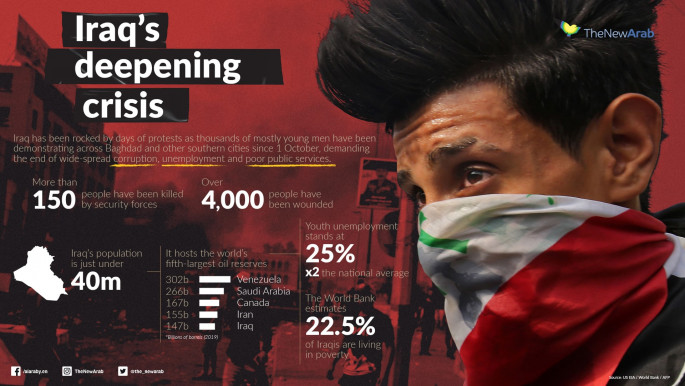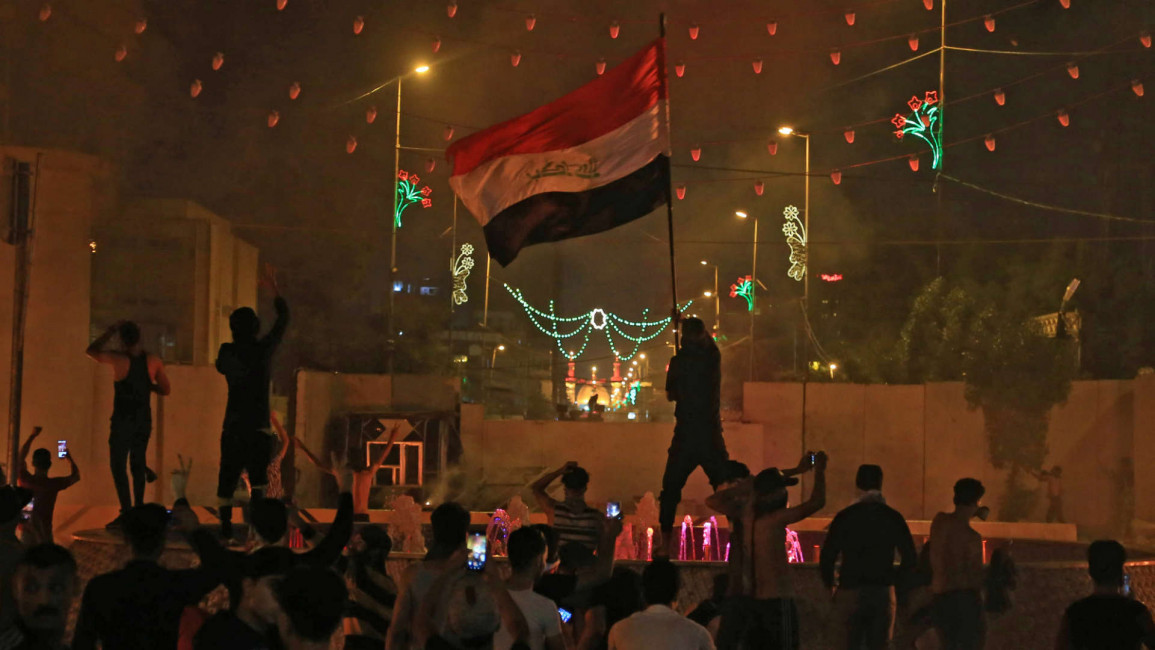Follow us on Twitter (@the_newarab) and Instagram (@thenewarab)
Fierce protests and violent crackdown in Iraq kill dozens in one day
Renewed anti-government demonstrations across the country rapidly claimed the lives of dozens through tear gas, live rounds and fires, a watchdog and security sources told AFP.
A week of protests in early October left more than 150 people dead.
This month has also witnessed continued protests in Algeria and Sudan, in addition to unprecedented mass anti-sectarian rallies across Lebanon.
Rallies had been due to resume on Friday, with a range of actors from Iraq's highest Shia authority to the United Nations urging restraint amid fears of further violence.
The demonstrations began early and calm on Thursday evening, with protesters seen exchanging flowers with security forces and the interior minister insisting police would "protect" protesters.
But by the time thousands of protestors amassed in Baghdad's Tahrir Square, Aviation Square, and the high-security Green Zone on Friday morning, two were dead.
At least 42 protesters were dead by Friday evening, at least half of them killed as they attacked the headquarters of armed factions or government bodies.
Twelve died in the southern city of Diwaniyah alone, while setting fire to the headquarters of the powerful Badr organisation, part of the Iran-linked Hashd al-Shaabi paramilitary force, security sources told AFP.
Another 30 were killed according to a toll compiled by the Iraqi Human Rights Commission, which did not include the Diwaniyah dead.
The national rights watchdog said the demonstrators were killed by gunshots or tear gas canisters in the capital and four southern provinces.
Several died while trying to storm the offices of Asaib Ahl al-Haq, another Iran-backed militia, in two southern cities.
Parliament is scheduled to meet on Saturday to discuss the protests further.
Security forces imposed a curfew across several southern provinces late Friday, a move also implemented earlier this month in the first wave of anti-government protests.
Among the provinces targeted was Basra, which was swept up in its own wave of protests last year over moribund public services, with outraged citizens also burning government and party offices.
Similar grievances sparked this month's protests: one in five Iraqis lives in poverty and youth unemployment sits around 25 percent, according to the World Bank.
Baghdad ranks as OPEC's second-biggest oil producer - but it is also the 12th most corrupt nation in the world, according to Transparency International.
Protesters have decried endemic government corruption and poor public services.
This year's demonstrations are seen as unprecedented due to their independence from any political or religious faction and the violence with which they have been met.
At least 157 were killed during the first few days of October, according to a government probe.
 |
UN Secretary General Antonio Guterres on Friday said the deaths were the result of "substantial" rights violations.
"We deeply regret the number, the large number of people that have been killed in these circumstances," he said.
Activists had urged Iraqis to return to the streets on Friday to mark a year since Prime Minister Adel Abdel Mahdi came to power.
It was also the deadline set out by Iraq's top Shia cleric, Grand Ayatollah Ali al-Sistani, for Abdel Mahdi to respond to demonstrators' demands.
Sistani's representative on Friday urged both protesters and security forces to show "restraint", warning of "chaos" if violence broke out again.
Protesters have called for the premier to step down.
While Abdel Mahdi has offered a package of reforms, including an anti-corruption campaign, a job creation drive and improved social welfare, demonstrators are unconvinced.
"Adel Abdel Mahdi is lying to us," protesters shouted in Baghdad, just hours after the premier's televised appearance in which he defended his reform agenda.
"They are all liars - they lie when they promise us jobs and when we protest, they fire tear gas at us!" shouted another.



